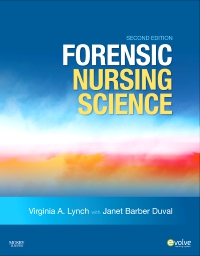
Forensic Nursing Science, 2nd Edition
Hardcover

Now $118.10
Written and edited by the most respected authorities in forensic nursing and forensic sciences, this new edition provides the tools and concepts you need to collect evidence that is admissible in court, determine the significance of that evidence, and provide accurate, reliable testimony while administering high-quality patient care. Now in full color throughout, it remains the most comprehensive, highly illustrated text of its kind.
-
- Provides a comprehensive, updated guide to forensic nursing science, paying special attention to the International Association of Forensic Nurses’s (IAFN) goals for forensic nursing.
- Retains a focus on assessment skills and the collection and preservation of evidence, following the established guidelines of the forensic sciences. Prepares you to provide testimony as a fact witness or a forensic nursing expert. Includes an illustrated case study in almost every chapter, helping you relate the information to clinical practice.
- Highlights important recommendations for interventions in Best Practice boxes, including the evidence base for each.
- Summarizes important points in Key Point boxes, so you can quickly review the most important concepts in each chapter.
- Explores the evolving role of forensic nurses in today’s health care facilities and the community.
- Edited by Virginia Lynch, founding member and first President of the International Association of Forensic Nurses and Janet Barber Duval, both well-respected pioneers and educators in the field.
-
- Contains 300 full-color illustrations integrated throughout the text, so you can view evidence quickly and easily, as it is likely to appear in practice.
- Presents information on courtroom testimony and depositions in one reorganized, streamlined chapter, giving you a full, organized treatment of this extremely important topic.
- Includes twelve new chapters: Digital Evidence, Medical Evidence Recovery at the Death Scene, Asphyxia, Electrical and Thermal Injury, Intrafamilial Homicide and Unexplained Childhood Death, Human Trafficking, Credential Development for Forensic Nurses, Gangs and Hate Crimes, Ethics Issues in Forensic Nursing, Forensic Physics and Fracture Analysis, Sexual Deviant Behaviors and Crime and Forensic Epidemiology.
- Contains heavily revised information on Prehospital Evidence, Forensic Investigation in the Hospital, and Human Abuse and Deaths in Custody.
- Features critical thinking questions with every case study, so you can thoroughly consider the implications of each clinical scenario.
-
Table of Contents
UNIT I: Introduction to Forensic Nursing Science
1. Evolution of Forensic Nursing Science
2. Concepts and Theory of Forensic Nursing
3. Forensic Nursing Education
UNIT II: Principles and Techniques of Forensic Science
4: Forensic Epidemiology and the Forensic Nurse
5: Crime Scene Processing
6: Principles of Forensic Evidence Collection and Preservation
7: Forensic Photography
8: Behavioral Analysis
9: Digital Evidence and Forensic Investigations NEW
10: Forensic Toxicology
UNIT III: Evidence Collection in Human Subjects
11: Forensic First Response: Approach for Emergency Medical Personnel
12: Forensic Investigations in the Hospital
13: Sexual Assault Evidence Recovery
14: Evidence in the Emergency Department
15: Multi-Casualty Scenes
UNIT IV: Postmorten Science and Forensic Analysis
16: Forensic Investigation of Death
17: Forensic Nurse Examiners in Death Investigation
18: Intrafamilial Homicide and Unexplained Childhood Deaths
19: Medical Evidence Recovery at the Death Scene NEW
20: Postmorten Sexual Assault Evaluation
21: Analysis of Autoerotic Death Scenes
22: Taphonomy, Necrosearch, and Mass Grave Exhumation
UNIT V: Mechanisms of Injury and Death
23: Physics, Restraints, and Fractures
24: Motor Vehicle Collision Reconstruction
25: Blunt, Sharp, and Firearm Injuries
26: Bite-Mark Injuries
27: Asphyxia
28: Electrical, Thermal, and Inhalation Injuries
UNIT VI: Violence and Interpersonal Crimes: Role of the Forensic Nurse
29: Child Maltreatment: Forensic Biomarkers
30: Elder Maltreatment: Forensic Biomarkers
31: Relationship Crimes
32: Sexual Violence: Victims and Offenders
33: The Sequelae of Sexual Violence
34: Sexual Exploitation of Children and Child Pornography
35: Youth Gangs and Hate Crimes NEW
UNIT VII: Forensic Mental Health and Correctional Issues
36: Psychiatric Forensic Nursing
37: Suicidal Behavior and Risk Assessments
38: Forensic Nursing in Correctional Care
39: Sudden Death During Restraint: Excited Delirium Syndrome
UNIT VIII: Global and Cultural Crimes
40: Socio-Cultural Crimes: A Forensic Approach
41: Sexual Deviant Behavior and Crimes
42: Female Genital Mutilation
43: Human Trafficking
UNIT IX: Legal and Ethical Issues in Forensic Nursing Roles
44: Legal and Ethical Issues in Forensic Nursing Roles
45: Testifying as a Forensic Nurse
46: Malpractice and Negligence
47: Ethics and Ethical Decision Making in Forensic Nursing NEW
48: Research with Vulnerable Subjects
49: Organ Donation and Tissue Transplantation
50: International Law and the Forensic Nurse Examiner
UNIT X: Credentialing and Career Planning
51: Credential Development for Forensic Nurses
52: Global Expansion and Future Perspectives
Appendix A: International Association of Forensic Nurses Vision of Ethical Practice
Appendix B: Nursing Diagnoses for Forensic Nursing Problems and Issues
Appendix C: Procedures for Sexual Assault Examination for Male Victims


 as described in our
as described in our 